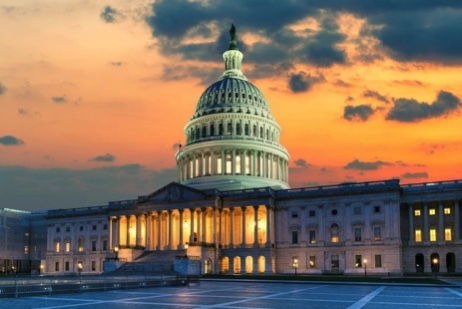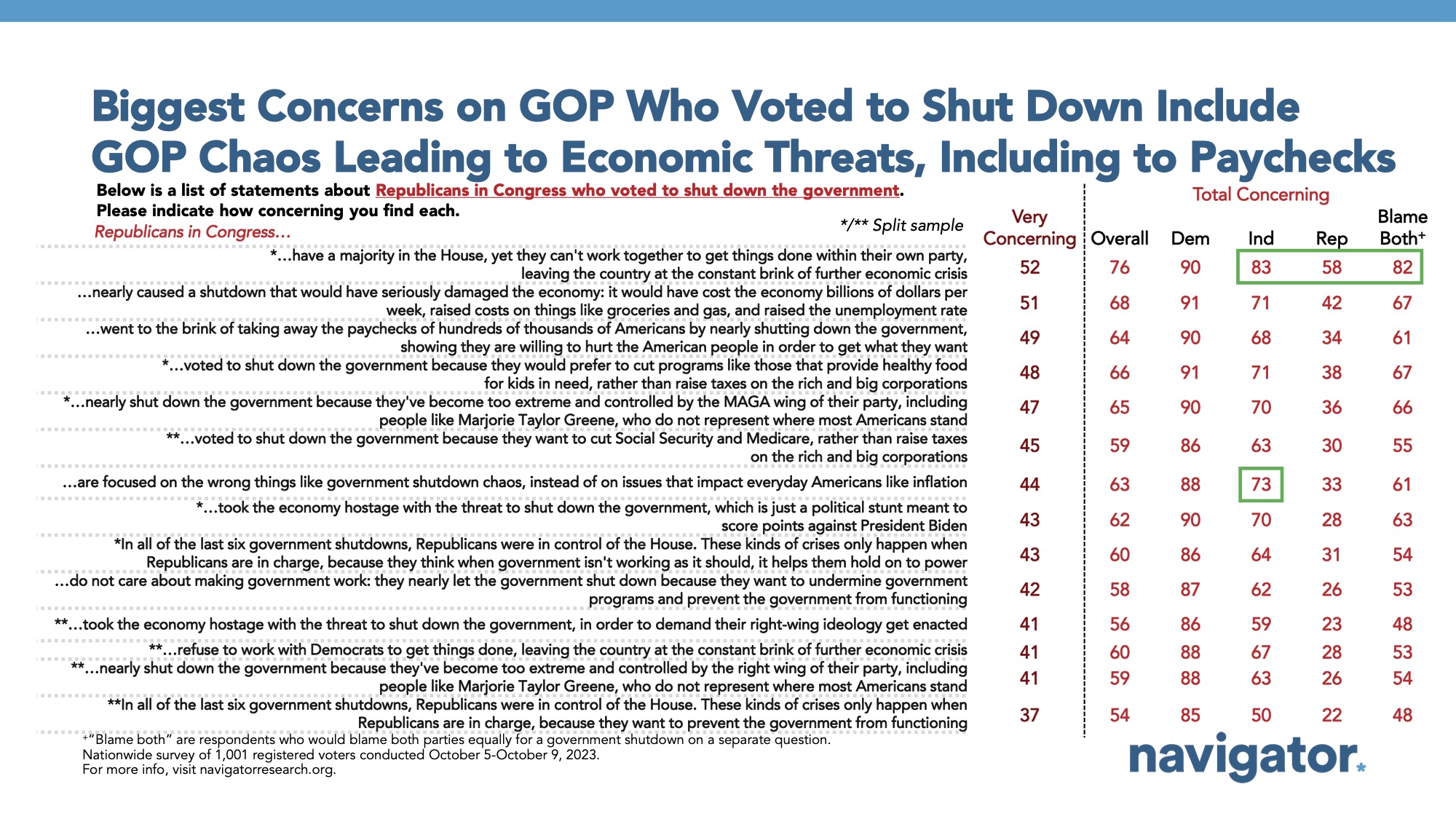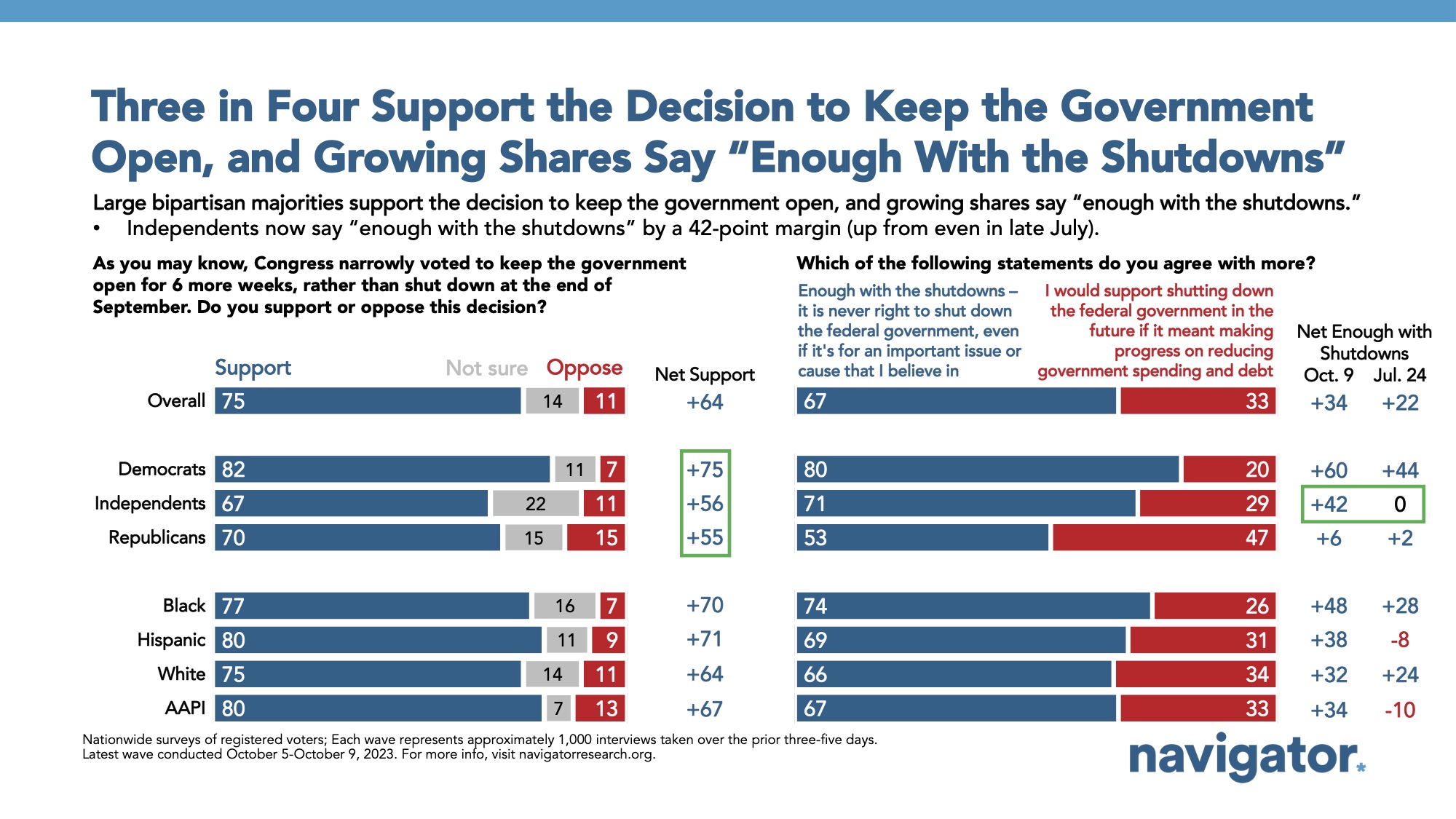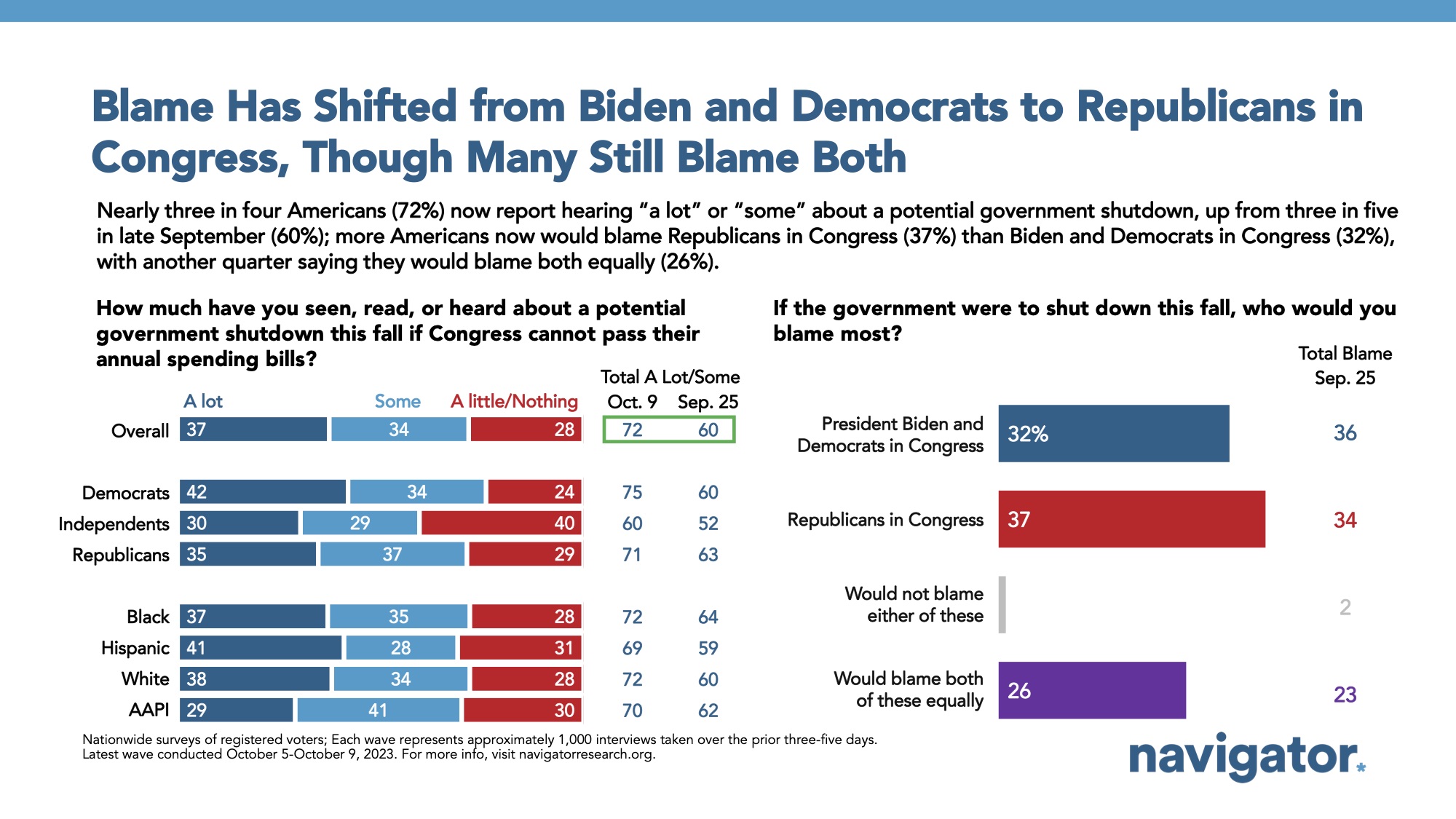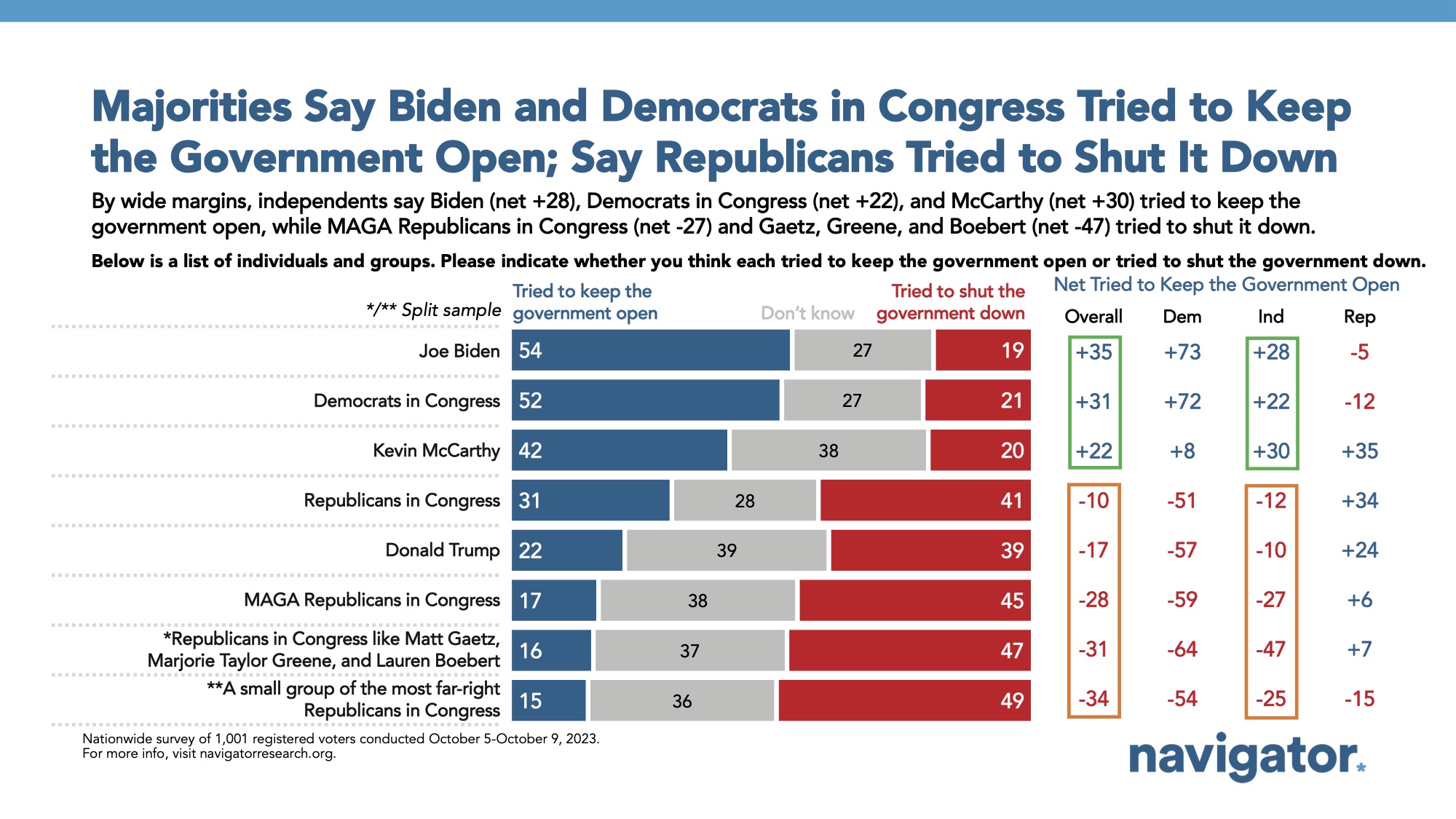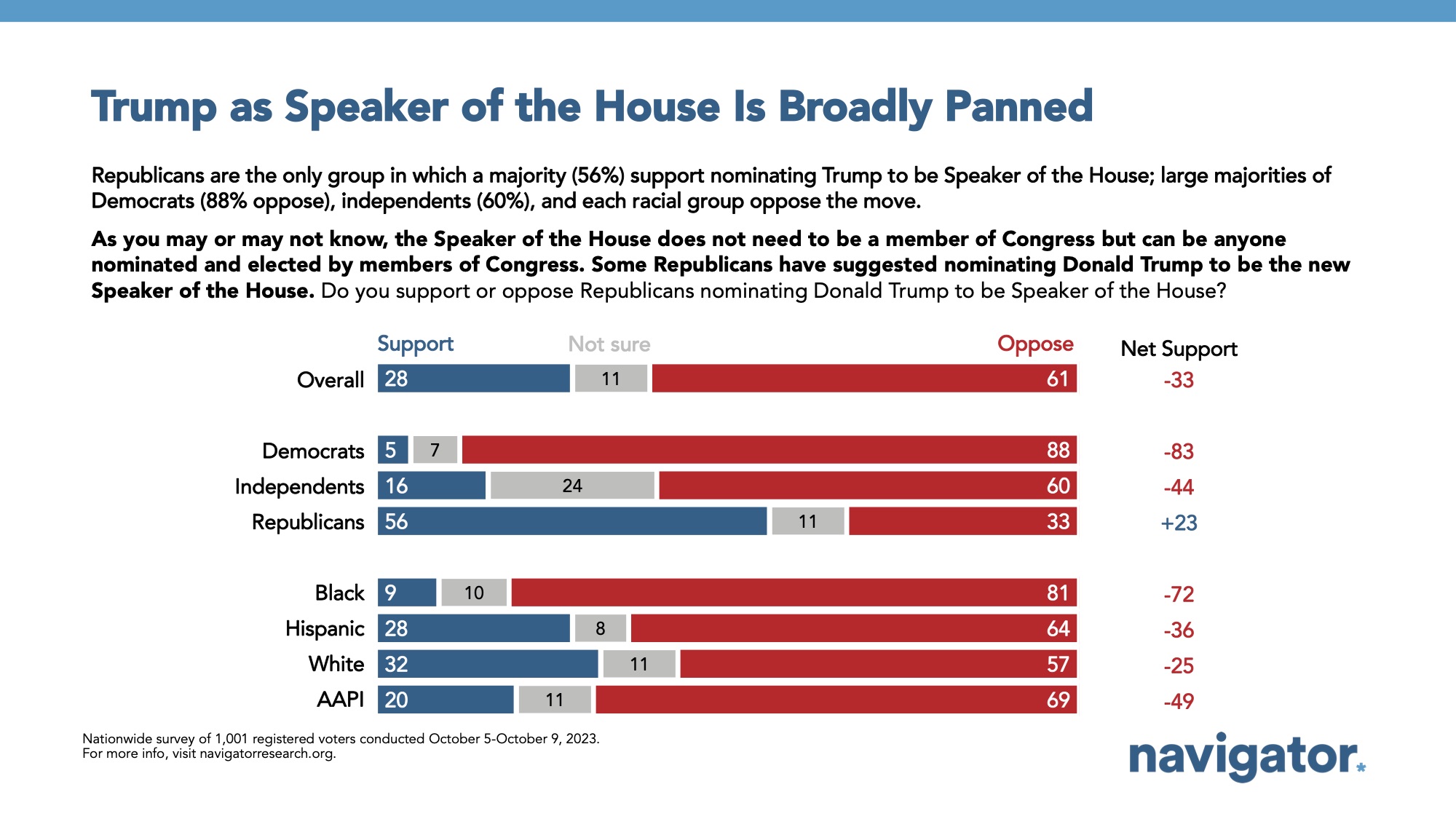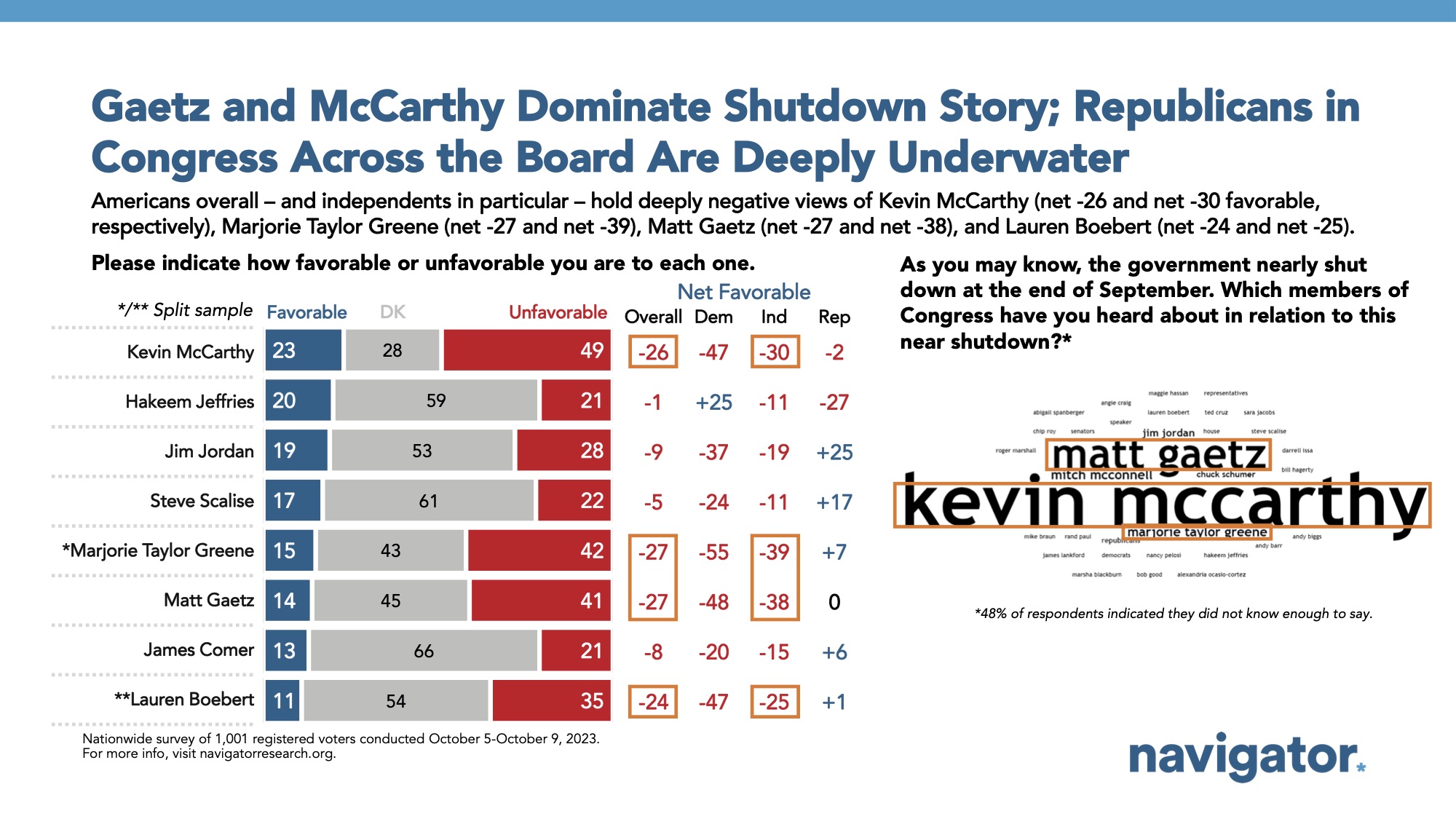Poll: Americans Agree It Is Never Right to Shut the Government Down
This Navigator Research report contains polling data on reactions to Congress continuing to fund the federal government and avoiding a shutdown for 6 weeks, as well as top concerns about Republicans in Congress who voted to shut the government down, and how perceptions have shifted on who to blame for a potential government shutdown this fall.
Additionally, Navigator hosted a panel discussion on September 21 entitled The Shutdown & Beyond: A Panel Discussion on the Broader Tax Fight, featuring Michael Linden (former Executive Associate Director at the Office of Management and Budget), Kitty Richards (Acting Executive Director, Groundwork Collaborative), Joel Payne (Chief Communications Officer, MoveOn), Kate Berner (former Principal Deputy Communications Director at The White House), and Naveed Shah (Political Director, Common Defense). You can view the full video of this discussion here.
Americans are concerned about the damage a shutdown would have done to the economy.
The top concern Americans have about Republicans in Congress who voted to shut down the government last month focuses on the chaos they would have caused for the country. Among a variety of statements tested, the top statement considered the most concerning about Republicans in Congress who voted to shut down the government in September was: “Republicans in Congress have a majority in the House, yet they can’t work together to get things done within their own party, leaving the country at the constant brink of further economic crisis” (76 percent of Americans find this concerning, including 83 percent of independents). Americans’ concerns with chaos can be linked to other top concerns they have with what a Republican shutdown would mean to them personally, whether through harmful potential cuts to benefits or higher costs in their daily lives:
- Republicans in Congress nearly caused a shutdown that would have seriously damaged the economy: it would have cost the economy billions of dollars per week, raised costs on things like groceries and gas, and raised the unemployment rate (68 percent of Americans find this concerning, including 71 percent of independents);
- Republicans in Congress voted to shut down the government because they would prefer to cut programs like those that provide healthy food for kids in need, rather than raise taxes on the rich and big corporations (66 percent of Americans find this concerning, including 71 percent of independents);
- Republicans in Congress went to the brink of taking away the paychecks of hundreds of thousands of Americans by nearly shutting down the government, showing they are willing to hurt the American people in order to get what they want (64 percent of Americans find this concerning, including 68 percent of independents).
Other concerns about Republicans in Congress who voted to shut the government down were less effective, including that “in all of the last six government shutdowns, Republicans were in control of the House… these kinds of crises only happen when Republicans are in charge, because they think when government isn’t working as it should, it helps them hold on to power” (60 percent concerning), that “Republicans in Congress do not care about making government work: they nearly let the government shut down because they want to undermine government programs and prevent the government from functioning” (58 percent concerning), and that “Republicans in Congress took the economy hostage with the threat to shut down the government, in order to demand their right-wing ideology get enacted” (56 percent concerning).
Three in four Americans support Congress’s vote to keep the government open for 6 weeks rather than shutting down at the end of September.
By a 64-point margin, Americans support Congress averting a shutdown, including support from more than four in five Democrats (net +75; 82 percent support – 7 percent oppose), two-thirds of independents (net +56; 67 percent support – 11 percent oppose), and even seven in ten Republicans (net +55; 70 percent support – 15 percent oppose). Support for Congress passing a six-week continuing resolution to avoid a government shutdown earned support from two in three of some of the most conservative constituencies, including Republicans who watch Fox News (net +55; 68 percent support – 13 percent oppose), Americans unvaccinated against the coronavirus (net +49; 64 percent support – 15 percent oppose), and Republicans who identify as very conservative (net +45; 66 percent support – 21 percent oppose).
- By a 34-point margin, two in three Americans agree more that “it is never right to shut down the federal government, even if it’s for an important issue or cause that I believe in” (67 percent) than agree that they would “support a federal government shutdown in the future if it meant making progress on reducing government spending and debt” (33 percent). 80 percent of Democrats, 71 percent of independents, and even a majority of Republicans now believe it is never right to shut down the federal government (53 percent). This represents a net 12-point shift since July in the share who believe we should never shut down the government (when it was net +22; 61 percent to 39 percent, respectively), driven by a 42-point net shift among independents against shutting down the government.
A plurality of Americans would now blame Republicans in Congress if there were a government shutdown this fall, a shift of 7 points in the last two weeks.
37 percent would now blame Republicans in Congress for a shutdown, compared to 32 percent who would blame President Biden and Democrats and another 26 percent who would blame both parties equally. Two weeks ago, 36 percent said they would blame Biden and Democrats compared to 34 percent who said they would blame Republicans in Congress.
- Majorities of Americans believe that President Biden tried to keep the government open (net +35; 54 percent tried to keep open – 19 percent tried to shut down) and say the same about Democrats in Congress (net +32; 51 percent tried to keep open – 21 percent tried to shut down).
- Pluralities believe a wide range of Republican individuals and groups were trying to shut the government down, including a small group of the most far-right Republicans in Congress (net -34; 15 percent tried to keep open – 49 percent tried to shut down), Donald Trump (net -17; 22 percent tried to keep open – 39 percent tried to shut down), and Republicans in Congress more generally (net -10; 31 percent tried to keep open – 41 percent tried to shut down).
Bonus finding: More than three in five Americans oppose Donald Trump being nominated to become the next Speaker of the House.
Following the removal of Kevin McCarthy as Speaker, by a greater than two-to-one margin, most Americans oppose the idea of Trump being nominated to become Speaker (28 percent support – 61 percent oppose), including opposition from nearly nine in ten Democrats (88 percent), three in five independents (60 percent), and even a third of Republicans (33 percent).
- Net favorability of Kevin McCarthy has fallen to an all-time low of 26 points underwater (23 percent favorable – 49 percent unfavorable), down from net -15 in June and marking the first time he has had net negative ratings among Republicans (net -2; 35 percent favorable – 37 percent unfavorable). The two primary candidates to become Speaker are lesser known, but start with net negative ratings: Steve Scalise has a net -5 favorable rating nationally (17 percent favorable – 22 percent unfavorable) and Jim Jordan has a net -9 favorability rating (19 percent favorable – 28 percent unfavorable). Matt Gaetz — who initiated the motion to vacate that removed Kevin McCarthy from being Speaker — earns the lowest overall favorability rating among figures involved in this situation (net -27; 14 percent favorable – 41 percent unfavorable).
